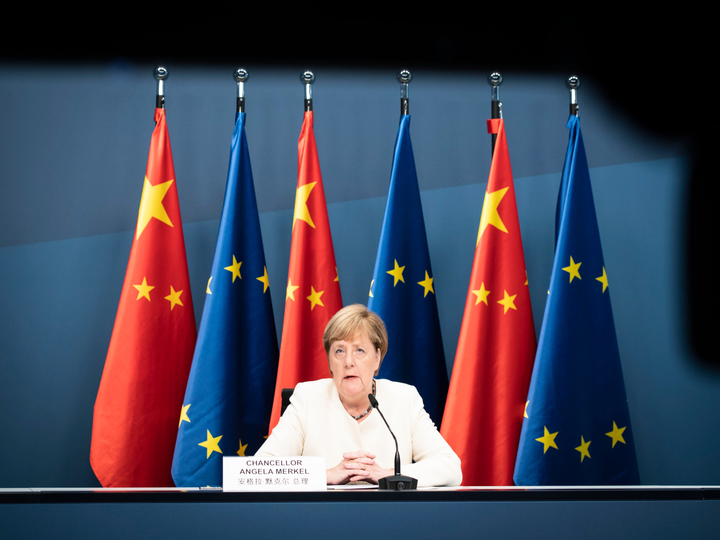by Stephan Richter and Uwe Bott*
Ever since 2005, German chancellors stand out for exhibiting a tendency late in their rein to display strategic and geoeconomic leanings which, in the ultimate analysis, put Germany’s hard-fought post-WWII commitment to a strong Western orientation into question.
Schroder/s pro-Russia move
The first case was that of Gerhard Schroder, Germany’s Chancellor between 1998 and late 2005.
After having earned considerable merit by undertaking sensible structural reforms of his country’s national economy, he made a peculiar move toward the very end of his term in office.
Keen on tying Germany’s energy security ever closer to Putin’s Russia, he rushed to close the North Stream 1 gas pipeline deal just days ahead of the September 2005 federal election — which he lost.
Merkel/s pro-China move
Now, it is Angela Merkel’s turn to create another fait accompli, in her case just a few weeks before the Biden administration takes office.
The German Chancellor will be stepping down later this year and has always made a great ado about deep appreciation of the United States.
Given that, it is all the more surprising that, now that the Trump era is finally over, she has pulled a unilateral move a la Trump.
There is no other way to interpret why she pushed the EU very hard to coddle up to Xi Jinping’s China by concluding the Comprehensive Agreement on Investment (CAI) deal with China just now.
Repeating Bill Clinton/s errors, 20 years after
The most charitable interpretation is that Mrs. Merkel is repeating the double mistake which Bill Clinton made in the context of China’s WTO accession — hyper-optimism and taking the Chinese at their word.
However, why she would choose to do so two decades after it happened to Clinton remains her secret.
The less charitable interpretation, based on background briefings by the German government, is that she and her team saw it as a gleeful moment to stick it to the Americans.
There was outright happiness in having exploited the period before the new Biden team takes power in Washington. This apparently is what Berlin considers “strategic autonomy.”
Beyond the transatlantic context, the German Chancellor acted tactically in response to a Chinese charm offensive and materially, as to the “compromises” found, solidly on the CCP’s preferred terms.
Merkel/s confirmation bias
Merkel evidently suffers from what is called confirmation bias. She seriously seems to believe that the Chinese will live up to the letter and spirit of the agreement.
With all her China-related experience, one would have expected far more realism from Merkel. As to the core issue of taking the Chinese at their word, there is a two-word answer to that: Hong Kong.
Specifically, given the character of the Chinese political system, China’s supposed labor rights “concession” does not amount to any real deliverable.
Chinese diplomats will regard it as meaningless, because it directly impacts the CCP’s control over the workplace and thus indeed constitutes direct interference in domestic affairs.
In that regard, China’s commitment is not unlike its pro-forma acceptance of reciprocity before accession to the WTO.
How China swiftly played Merkel
The core element, a level playing field, remains elusive — not least because of China’s vast network of discriminatory treatment, both regulatory and informal.
And the highly touted labor rights concession may literally become the rope on which the more principled European progressives end up hanging themselves.
The Chinese regard it, at best, as a temporary, tactical concession, made with the same level of sincerity as the Sino-British agreement on Hong Kong.
In its own defense, the EU’s pro-Chinese camp points to the Vietnamese having also made a labor rights commitment in their FTA with the EU. But there is a monumental difference.
The EU has pressure points to ensure the Vietnamese will live up to the commitment. On China, it doesn’t.
Merkel/s static thinking
Angela Merkel is ultimately a victim of static thinking: True, Germany currently still does good business with China, but that is going to change considerably as the Chinese are becoming ever more of a direct competitor.
It is hard to see how more openness toward China, which has a long history of hollowing out, never mind ever fulfilling agreements they conclude, will help the German or European economy.
Furthermore, Mrs. Merkel once again displayed her inclination to act on behalf of the German car manufacturers, for whom China is the key market now. But that commercial favoritism alone cannot justify her pushing so hard to please Xi Jinping.
A pivotal moment wasted
In the long view, it will come to be seen as downright tragic that Mrs. Merkel did Xi’s bidding precisely at the moment when weaker EU economies such as Greece had finally seen the futility of selling out to the Chinese.
That Merkel did all this just three weeks before Joe Biden assumes office in Washington, even though the Biden team had sent clear signals that it wanted to coordinate with the EU on how best to counter the Chinese threat before the EU inks its China deal, leads to two conclusions:
First, Merkel knew that Joe Biden will take a very different, firmer approach from hers regarding China.
Second, therefore she did not want real co-ordination with the new U.S. government.
Conclusion
Both Angela Merkel now and Gerhard Schroder 15 years ago bear personal and geostrategic responsibility for moves impairing the transatlantic partnership.
And all that to gain what are, when viewed in the greater context of Germany’s and Europe’s long-term interests, at best questionable, short-term advantages.
Under such auspices, the EU’s much vaunted “strategic autonomy” appears to boil down to a German vision of turning Europe into a lucrative destination on the Eurasian continent at the far end from China.
*Director and Chief Economist of the Global Ideas Center and Publisher and Senior Editor, The Globalist, Berlin/New York City
**first published in: www.theglobalist.com




 By: N. Peter Kramer
By: N. Peter Kramer
